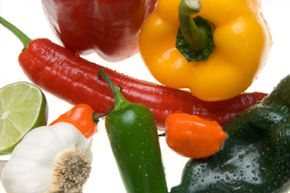If you loved indulging in that delicious, decadent meal at the restaurant, but later find the food has adversely affected your lips, you're probably not alone. Several kinds of foods can irritate the sensitive skin on your lips, whether briefly or more permanently.
As for temporary irritations, spicy foods might bother your lips or cause them to burn. Salty foods such as potato chips or popcorn might dry out your lips if you eat too much. And any food that sticks to your lips and causes you to lick them repeatedly can dry them out further, because saliva can dry out your skin's natural moisture. But these are short-term problems with simple fixes. Drink milk to negate the spicy food's heat or water to add back moisture -- or just avoid the problem food.
Advertisement
But if your lip irritation is more frequent or long-lasting, you might be among a small percentage of people with a food allergy. About 4 percent of adults and 6 to 8 percent of young children have allergic reactions to certain foods [source: Mayo Clinic]. Food allergies can appear at any point during your lifetime.
A food allergy is a response of your body's immune system; so, when you eat a food that you're allergic to, your immune system causes your body to produce antibodies and histamines [source: Mayo Clinic]. Food allergies can trigger more severe and potentially life-threatening reactions, but symptoms typically include itching and swelling of the lips and other areas of the face, in addition to a rash and wheezing. Common allergens are fish, shellfish, peanuts and tree nuts. In young children, the most common food allergies also include wheat, soy, milk and eggs [source: MedlinePlus].
A special type of allergic response, known as oral allergy syndrome, occurs in some people who have airborne pollen allergies such as ragweed or tree pollen. These people might have an adverse reaction after eating certain fresh fruits, vegetables or other plant-related foods. Usually the reaction is immediate and comes in the form of itching and swelling. It often affects the lips in addition to the face, mouth, tongue and throat. Cooking, peeling or eating canned versions might make it possible for people with a food allergy syndrome to eat the offending food without a reaction [source: Bassett and Bragin].
So if you feel your mouth swell or itch after eating, and it doesn't go away, you might need to see a doctor to see whether you have a food allergy. For more information on skin care and food allergies, read on to the next page.
Advertisement


